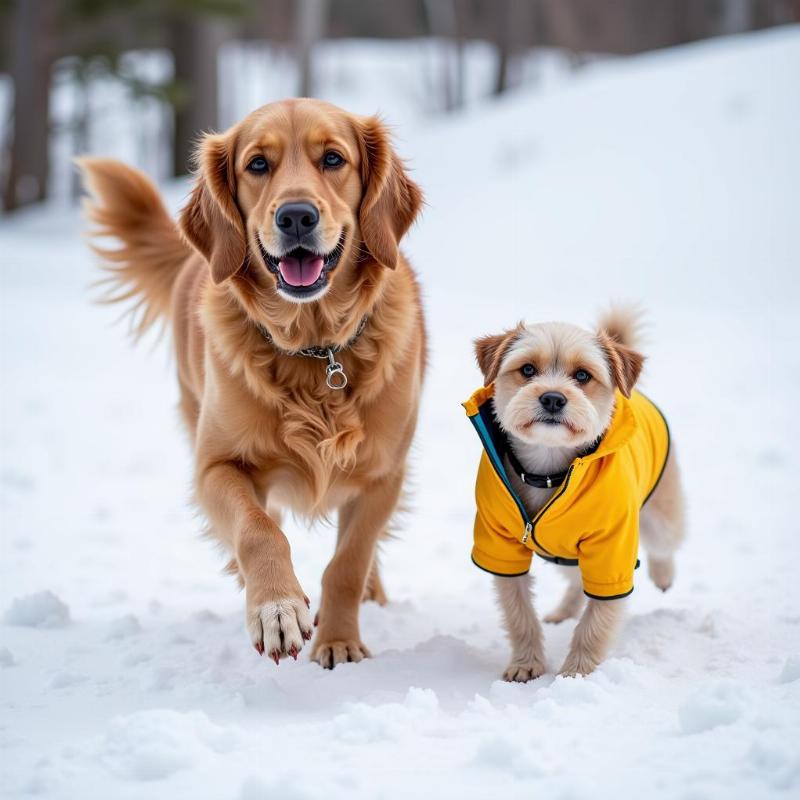Winter wonderland or winter worryland? Many dog owners wonder, “can dogs play in the snow?” The answer, like most things dog-related, isn’t a simple yes or no. It depends on a variety of factors, including your dog’s breed, size, age, coat type, and overall health. Let’s delve into the snowy details and ensure your furry friend enjoys a safe and fun winter season.
Factors Influencing a Dog’s Ability to Play in Snow
Several key factors determine whether your dog can frolic freely in the snow or needs extra precautions.
Breed and Size
Some breeds, like Siberian Huskies and Alaskan Malamutes, are built for snowy climates with their thick double coats and inherent cold tolerance. Smaller dogs, with less body mass and often thinner coats, are more susceptible to the cold. Chihuahuas and other toy breeds, for example, will likely chill much faster than a robust Labrador Retriever.
Age and Health
Senior dogs and puppies are more vulnerable to extreme temperatures. Arthritis in older dogs can be aggravated by the cold, and puppies haven’t fully developed their temperature regulation systems. Similarly, dogs with pre-existing health conditions, such as heart or respiratory issues, should have limited exposure to cold weather.
Coat Type
A dog’s coat plays a crucial role in their cold weather tolerance. Double-coated breeds are naturally insulated, while short-haired breeds benefit from added protection like warm and waterproof dog coats.
 Dogs playing in the snow
Dogs playing in the snow
Safe Snow Play Tips for Your Dog
Want to ensure your canine companion enjoys the snow safely? Follow these tips for a happy and healthy winter playtime:
- Limit Exposure: Even cold-hardy breeds shouldn’t be left outside in freezing temperatures for extended periods. Monitor your dog for signs of shivering, discomfort, or anxiety.
- Provide Shelter: Ensure your dog has access to a warm, dry shelter when playing outside in the snow.
- Check Paws Regularly: Snow, ice, and road salt can irritate a dog’s paws. Check for cracks, redness, or ice buildup between the pads and wipe their paws clean after each outing. Consider using dog booties for extra protection.
- Keep Hydrated: Just like in warmer months, dogs need access to fresh water in the winter. Ensure their water bowl isn’t frozen.
- Beware of Antifreeze: Antifreeze is highly toxic to dogs. Clean up any spills immediately and store antifreeze products safely out of reach.
Recognizing Signs of Hypothermia in Dogs
Knowing the signs of hypothermia is crucial for any dog owner venturing into the snow. Look out for:
- Shivering
- Weakness
- Lethargy
- Slowed breathing
- Stiff muscles
If you suspect your dog is suffering from hypothermia, seek immediate veterinary attention.
Can all breeds of dogs play in the snow?
While some breeds thrive in cold weather, others are less suited for snowy adventures. Breeds like dogs that are similar to huskies are built for the cold, while short-haired breeds may need extra protection. Understanding your dog’s specific needs is key.
What about dogs with webbed feet?
Some breeds, like do australian cattle dogs have webbed feet, have webbed feet that can help them navigate snowy terrain more easily. This doesn’t necessarily mean they are immune to the cold, but it can provide an advantage in snowy environments.
Conclusion
So, can dogs play in the snow? Absolutely, with the right precautions and considerations. By understanding your dog’s individual needs and following these guidelines, you can ensure a safe and enjoyable winter wonderland experience for both of you. Remember to monitor your dog closely, provide adequate protection, and be mindful of potential hazards. With a little preparation, both you and your furry friend can embrace the joys of a snowy day.
FAQ
- How long can my dog stay outside in the snow? This depends on your dog’s breed, size, age, and overall health. Monitor them closely for signs of discomfort and limit exposure to extreme cold.
- What should I do if my dog’s paws get irritated by the snow? Wipe their paws clean after each outing and consider using dog booties.
- Is antifreeze dangerous for dogs? Yes, antifreeze is highly toxic to dogs. Clean up any spills immediately and store it safely out of reach.
- What are the signs of hypothermia in dogs? Shivering, weakness, lethargy, slowed breathing, and stiff muscles are all signs of hypothermia.
- Do I need to put a coat on my dog in the snow? Short-haired breeds and dogs sensitive to the cold benefit greatly from a warm and waterproof dog coat.
- What are some good winter activities to do with my dog? Playing fetch in the snow, going for short walks, and even building a snowman together can be fun winter activities.
- Can I let my dog eat snow? While a small amount of fresh snow is usually harmless, large quantities can cause digestive upset. It’s best to discourage your dog from eating snow.
Beautdogs.us: Your Trusted Source for Dog Care
Beautdogs.us is a leading dog lifestyle website in the US, providing expert advice on dog breeds, care, and products. We are passionate about helping dog owners like you navigate the joys and challenges of canine companionship. Whether you’re a seasoned dog owner or just starting your journey, Beautdogs.us offers valuable resources and information to ensure your furry friend thrives. Contact us at [email protected] or +1 501-555-7529 for expert advice.